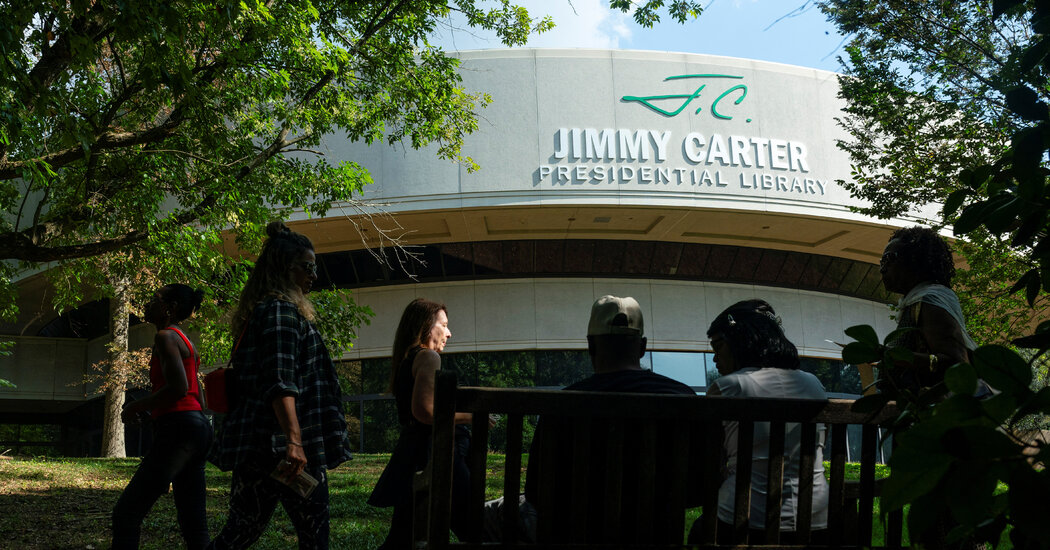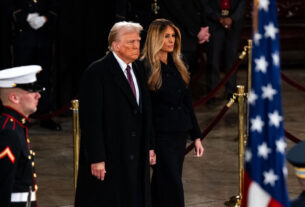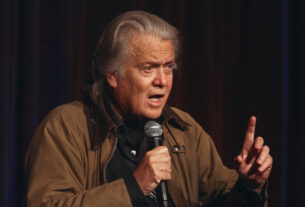Three book events at the Jimmy Carter Presidential Library and Museum in Atlanta were abruptly canceled late this week, raising questions about whether leadership changes at the National Archives and Records Administration were affecting programming at the 13 presidential libraries it oversees.
The events, which featured authors of books on climate change, homelessness and the civil rights movement, had been scheduled months earlier. But this week, the authors were told they would have to move to other venues and the events were removed from the library’s website.
Among the affected authors was Elaine Weiss, whose new book, “Spell Freedom: The Underground Schools that Built the Civil Rights Movement,” tells the story of the Highlander Folk School. In the 1950s, it began organizing “citizenship schools” where Black southerners were trained to pass the Jim Crow-era literacy tests designed to prevent them from voting.
In an interview, Ms. Weiss said the event had been arranged in November. But on Thursday afternoon, she said, her publicist at Simon & Schuster informed her that she had been told it could not go forward because the library, which was facing staff cuts, now needs approval from Washington for all programming. (Simon & Schuster declined to comment.)
Ms. Weiss said that she did not know whether the event had been called off because of the subject of her book. But she called the sudden cancellation “chilling.”
“The idea that a program about a book about democracy has to be approved by someone in Washington was and should be for everyone very scary,” she said. “The book is about voting rights, and about using education as a liberating tool.”
The other speakers whose events were canceled include Mike Tidwell, the author of “The Lost Trees of Willow Avenue: A Story of Climate and Hope on One American Street,” and Brian Goldstone, the author of “There Is No Place for Us,” about five “working homeless” families in Atlanta. By Friday evening, information about all three events had been removed from the library’s website.
In a statement, Crown, Mr. Goldstone’s publisher, said that the local bookseller helping organize the event contacted it on Feb. 19 “to let us know that the Carter Library would now need to seek approval from the National Archives for all programs, even those already scheduled.” The next day, the publisher was told it would be moved to a different location.
Multiple inquiries sent to several officials at the Carter library received no response.
The press office of the National Archives in Washington declined to answer directly whether it had discussed the events with the Carter Library. But in a statement, it said that it “entrusts” leadership at each presidential library to make programming decisions.
“Programs and events must always advance and uphold NARA’s core mission: to preserve the records of the United States and make them available to the public,” the statement said. “On this issue, leadership at the Carter Presidential Library is empowered to make their own decisions about scheduling events and programs.”
The cancellations at the Carter Library come amid broader turmoil at the National Archives, as President Trump works to remake the federal government through budget cuts and seeks retribution against perceived foes.
On Feb. 7, President Trump, who has tangled with the archives over his reluctance to return classified documents after leaving office in 2021, abruptly fired Colleen J. Shogan, the national archivist. (Shogan, a former official at the Library of Congress and the White House Historical Association, was appointed by former President Joseph R. Biden Jr.)
Mr. Trump named Secretary of State Marco Rubio as acting archivist, and announced on Feb. 16 that Jim Byron, the chief executive of the Richard Nixon Foundation, a private group connected with the Nixon presidential library in California, would manage the archives “on a day-to-day basis” until a permanent archivist is appointed.
Earlier this month, the John F. Kennedy Library and Museum in Boston abruptly closed its doors to the public in the middle of the day, after what a member of the Kennedy family claimed were staff cuts demanded by Elon Musk’s so-called Department of Government Efficiency. (The library reopened the next day, and the archives did not provide any explanation for the brief closure.)
Some planned events at the Carter Library appear to be unaffected. An event on Feb. 26 featuring the legal analyst Jeffrey Toobin, author of a new book on presidential pardons, was still scheduled. Other events still listed on its website include an event with the African-American artist Lonnie Holley.
Ms. Weiss’s event will now be held at the Georgia Center for the Book, a private nonprofit affiliated with the Library of Congress. She said it was ironic that an event about the fight for equal voting rights would be canceled at the Carter Library, an institution dedicated to the legacy of “a man who stood up for democracy around the world.”
“We are being told that we all have to tell ‘patriotic’ stories about American history,” she said. “To me, this is the most patriotic story imaginable.”





